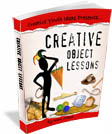Paul, the apostle said, “I have become all things to all men that by all means I may save some.” ( I Cor. 9:19-23) Paul was a master at learning how to communicate in terms that were most contextually effective. Good teachers and leaders spend as much time considering the needs of their youth as they do in planning the content for their lessons. The best teachers have learned to teach in the way they LEARNERS prefer, rather than according to their PERSONAL learning styles.
Characteristics of Right Brain Oriented Thinkers
- Prefer to learn through their emotions (intuitive senses)
- Prefer to learn through a problem solving approach (Prefer inductive learning (moving from real-life to theory) rather than a deductive approach (moving from theory to application)
- Prefer examples, demonstrations, and case studies rather than studying theories
- Respond more to an emotional presentation that provides more inspiration than information
- More interested in how ideas are presented and by whom than the content which is given
- More contextually dependent in their approach to problem solving (More focused on the situation rather than rules and principles; more experiential in solving problems than abstract)
- Prefer to learn by doing rather than listening to others teach
- Prefer to follow the examples of people who they feel can be trusted
- More interested in relationships than almost any other thing
- Willing to follow leaders regardless of their character faults
- Need to feel accepted, liked and approved
- Skilled in presenting oneself in a socially approved and diplomatic manner
- Need attention, recognition and public support (compliments, emotional reinforcement, public affirmation)
- Able and willing to compensate for others’ weaknesses, shortcomings or deficiencies because of their emotional empathy
- Need positive reinforcement, respect and recognition before cooperation is given
- Prefer intuitive, sensory and experiential decision-making that is reinforced by the group
- Prefer to look at similarities and comparisons
- Prefers open-ended experiments that allow for creativity
- Respond best to demonstrated instruction
- Draw upon qualitative patterns in people that are not sequential, but are indicative of one’s felt images
- Prefer information to be given in verbal and personal presentations
- Tend to be subjective
- Freely express feelings
- Rely mostly on images in thinking and remembering
- Prefer the authority of their group rather than of an individual
- Solve problems with hunches and previous patterns observed in people or groups
Characteristics of Left Brain Oriented Thinkers
- Prefer to learn through the use of principles (deductive) rather than through a problem-solving approach (inductive) or a trial and error method.
- Prefer to understand the principles of how and why things work rather than looking at a variety of examples, demonstrations or case studies
- Generally more responsive to an analytical presentation of the facts that are supported with solid results
- The quality, breadth, depth and relevance of the content is more important than how it is presented
- More contextually independent
- Prefer to learn from experts in the field
- Prefers to explore new ways of improving on old models
- More interested in accomplishing tasks
- More willing to follow leaders that measure up to their character, mental and productivity standards
- Need to feel a sense of accomplishment
- Skilled in presenting information in a qualitative and quantitative manner
- Craves a sense of empowerment through the accomplishing of set goals
- Able and willing to compensate for others’ weakness, shortcoming and deficiencies because of their commitment to the greater goals
- Best dealt with through assistance in helping one to complete goals
- Need authority, resources and freedom to allow one to carry out goals
- Prefer rational, analytical and deductive decision-making that may or may not be supported by the group
- Prefers to look at differences and contrasts
- Is more theoretical in solving problems
- Prefer controlled experiments
- Respond best to oral and written instruction
- Prefer information to be given in written instruction
- Objective tendencies
- Control feelings most of the time
- Relies on written instruction in thinking and remembering
- Prefer hierarchical authority
- Solve problems logically, methodically, and sequentially by looking at the parts of people or things
 MORE IDEAS? See “Creative Object Lessons”
MORE IDEAS? See “Creative Object Lessons”
200 page e-book that explains everything you need to know when planning your very own object lessons. It contains 90 fully developed object lesson ideas and another 200 object lesson starter ideas based on Biblical idioms and Names / Descriptions of God.
